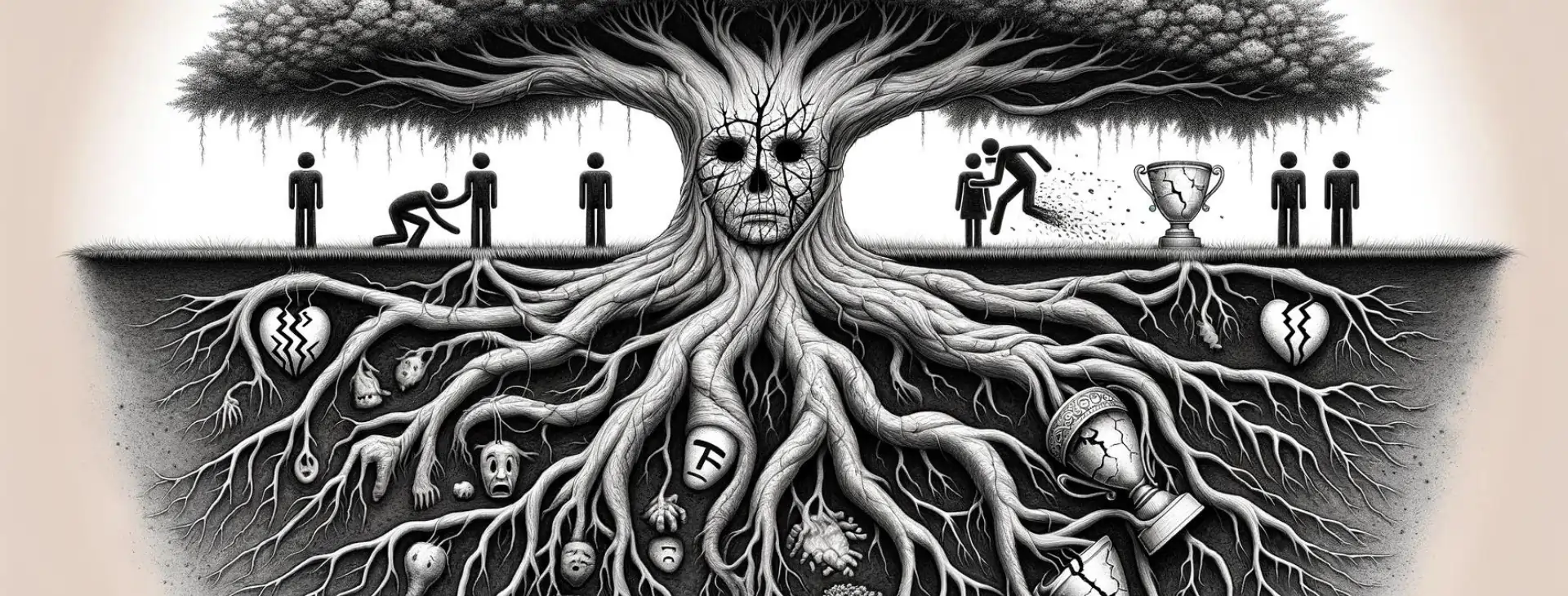
Fear is a powerful emotion that can grip us and hold us back from living our lives to the fullest. Living without fear is the true essence of embracing life wholeheartedly. It’s a reminder of the darkest journey I walked through, where I knew what it felt like to be in extreme depression, pain, and hopelessness. However, it was from those darkest hours that I realised what it truly means to learn courage, empathy for myself, and how to live life anew.
We are not superheroes – we are merely human. Even superheroes have endured their darkest moments, but from them, we learn that it’s about fearing the world less, not being fearless; minding less, not being mindless; and caring less, not being careless.

The Nature of Fear
Fear is a fundamental human emotion that serves as a protective mechanism, alerting us to potential threats or dangers. It’s an evolutionary response that triggers physiological changes, priming our bodies to either confront or flee from perceived risks or harm. While adaptive in certain situations, chronic or excessive fear can become debilitating, impacting mental and physical well-being, relationships, and overall quality of life for most people.
Living in a constant state of fear can foster anxiety, stress, depression, low self-esteem, and impaired decision-making abilities. Fear can manifest physically, contributing to health issues like cardiovascular problems and a weakened immune system. Ultimately, it prevents fully embracing life’s opportunities.
While it is a natural human emotion, it is possible to cultivate a mindset and develop strategies that allow us to live without being controlled by its grip. By understanding the causes, effects, and methods for overcoming fear, we can reclaim our power, embrace courage, and live life to its fullest potential.

Roots of Fear
Understanding the roots of our fears is crucial in addressing and overcoming them. Several factors can contribute to living in fear:
A. Personal Experiences
Traumatic events, abuse, or significant losses can deeply impact an individual’s psyche and shape their perceptions of safety and trust. These experiences can ingrain fear responses, making it challenging to move past them without proper support, insight and healing.
B. Environmental Factors
Living in unsafe neighbourhoods, war-torn areas, or environments characterised by violence, crime, or instability can foster a constant state of vigilance and fear for one’s safety and well-being.
C. Mental Health Conditions
Certain mental health conditions, such as anxiety disorders, post-traumatic stress disorder (PTSD), and phobias, can predispose individuals to experience heightened levels of fear and apprehension.
D. Media Influence and Societal Perceptions
The media’s portrayal of violence, crime, and other negative events, coupled with societal narratives and perceptions, can perpetuate a sense of fear and mistrust, even in relatively safe environments.
In-depth exploration of cultural and societal norms that perpetuate fear It’s crucial to examine how cultural and societal norms can contribute to the perpetuation of fear. Certain belief systems, traditions, or societal expectations may reinforce fear-based thinking patterns, leading individuals to internalise and perpetuate these fears.
Additionally, systemic issues like discrimination, marginalisation, and lack of representation can create an environment of fear and uncertainty for certain groups within society. Addressing these systemic issues and promoting inclusivity and understanding can help mitigate the impact of cultural and societal norms on fear.

Psychological and Physical Toll
Living in fear can take a toll on both our psychological and physical well-being. As someone who has experienced the depths of extreme depression, pain, and hopelessness, I can attest to the profound impact fear can have on our lives.
A. Anxiety and Stress
Fear often manifests as chronic anxiety and stress, which can be emotionally and mentally draining. Constant worry, racing thoughts, and a persistent sense of unease can consume our energy and focus, making it difficult to fully engage with life.
B. Depression and Low Self-Esteem
Prolonged exposure to fear can contribute to the development of depression and low self-esteem. Feeling powerless, afraid, overwhelmed, and unable to cope with perceived threats can erode our sense of self-worth and lead to a negative self-image.
C. Physical Health Issues
Fear triggers the release of stress hormones like cortisol, which can have detrimental effects on our physical health over time. Chronic fear and stress can contribute to cardiovascular problems, digestive issues, weakened immune function, and other health complications.
D. Impaired Decision-Making and Cognitive Function
When consumed by fear, our ability to think clearly and make rational decisions can be impaired. Fear can cloud our judgement, leading to poor decision-making and impaired cognitive function, further exacerbating the cycle of anxiety and stress.
It’s important to recognize that living in fear can also have significant impacts on our personal relationships and social interactions. It can lead to isolation, avoidance of social situations, and difficulty forming and maintaining meaningful connections with others.
This can result in feelings of loneliness, lack of support systems, and an overall diminished quality of life. Additionally, fear-based behaviours and thought patterns can strain existing relationships, leading to misunderstandings, conflicts, and strained communication.
Addressing the long-term effects of fear on our interpersonal relationships and social connections is crucial for overall well-being and personal growth.

Overcoming and Living Without Fear
While fear can be a formidable opponent, it is not insurmountable. There are various strategies and approaches that can help individuals overcome fear and reclaim their lives.
A. Therapy and Counseling
Professional support from licensed therapists and counsellors can be invaluable in addressing and overcoming fear. Several therapeutic approaches have proven effective:
- Cognitive-Behavioral Therapy (CBT): CBT focuses on identifying and challenging negative thought patterns and beliefs that contribute to fear and anxiety. Through CBT, individuals can learn to reframe their perspectives and develop healthier coping mechanisms.
- Exposure Therapy: Gradual and controlled exposure to feared stimuli or situations can help individuals desensitize and overcome their fears. This approach is often used for specific phobias or trauma-related fears.
- Mindfulness and Meditation: Mindfulness-based practices, such as meditation and mindful breathing exercises, can help individuals cultivate present-moment awareness, reduce stress and anxiety, and gain greater control over their emotional responses.
B. Building a Support System
Surrounding oneself with a strong support system of family, friends, or support groups can provide a sense of security and encouragement. Having a network of individuals who understand and validate one’s experiences can be instrumental in the healing process.
C. Developing Coping Mechanisms
Learning and practising effective coping mechanisms can help individuals manage fear and anxiety when they arise. These may include relaxation techniques, journaling, exercise, or engaging in activities that promote a sense of calm and well-being.
D. Challenging Negative Thought Patterns
Fear often stems from negative thought patterns and irrational beliefs. Challenging these thoughts through cognitive restructuring exercises can help individuals gain perspective and reframe their normal perceptions of fear-inducing situations or stimuli.
E. Personal Growth and Learning
Overcoming fear often requires a journey of personal growth and learning. As someone who has walked through the darkest of times, I’ve learned the importance of listening, rediscovering courage and faith, empathising with myself, and learning how to truly live life anew. It’s a process of unlearning fear-based patterns and embracing a mindset of resilience and self-compassion.
Exploration of alternative or holistic approaches to managing fear While traditional therapy and counselling can be highly effective in overcoming fear, it’s essential to recognize that individuals may find value in exploring alternative or holistic approaches as well. These may include practices like yoga, mindfulness meditation, energy healing, or incorporating spiritual or cultural practices that resonate with an individual’s beliefs and values.
Additionally, a holistic approach that addresses the physical, emotional, mental, and spiritual aspects of fear can provide a more comprehensive path to healing and growth.

Creating a Safer Environment
While overcoming fear is a personal journey, creating a safer environment can also contribute to a sense of security and well-being. This can be achieved through various means:
A. Personal Safety Measures
Taking proactive steps to enhance personal safety, such as improving home security, learning self-defence techniques, or being aware of one’s surroundings, can help alleviate fear and promote a sense of control.
B. Community Involvement and Awareness Programs
Engaging in community initiatives, neighbourhood watch programs, or awareness campaigns can foster a sense of collective responsibility and create a support system within one’s immediate environment.
C. Advocating for Policy Changes and Social Reform
Addressing systemic issues that contribute to fear and insecurity is crucial. Advocating for policy changes and social reforms that promote safety, inclusivity, and equal opportunities can help create a more secure environment for individuals and communities.
To truly create a safer environment, it’s essential to address the systemic issues that contribute to fear and insecurity. This can involve advocating for policies that promote equality, combat discrimination, and provide equal access to resources and opportunities.
Additionally, fostering open dialogues and education around issues of bias, prejudice, and marginalisation can help raise awareness and promote understanding and inclusivity within communities.
Implementing initiatives that empower underrepresented or marginalised groups can also play a vital role in creating a safer environment. This may involve providing support services, creating safe spaces, and amplifying voices that have been historically silenced or overlooked. By addressing systemic inequalities and promoting inclusivity, we can work towards creating a society where individuals from all backgrounds feel secure and valued.

Embracing the Journey
Living without fear is a journey of self-discovery, resilience, and growth. It requires us to confront our deepest fears, understand their origins, and develop strategies to overcome them. By having courage, fostering self-compassion, and cultivating a relationship with a support system, we can reclaim our power and live life to its fullest potential.
Addressing fear and promoting a sense of security is not just a personal endeavour; it has far-reaching implications for our communities and society as a whole. When individuals feel safe, empowered, and free from the grip of fear, they can contribute more fully to their relationships, workplaces, and communities. A society that fosters a sense of security and belonging is one that thrives, where individuals can reach their full potential and collectively work towards a better future.
To truly live without fear, a concerted effort from both individuals and society is required. On a personal level, each of us must embrace the journey of self-exploration, seek support when needed, and cultivate the courage to face and challenge our fears head-on. However, we must also recognize the role of societal structures and systems in perpetuating fear and insecurity. By advocating for policy changes, promoting inclusivity, and addressing systemic issues, we can create an environment that fosters a sense of safety and belonging for all.
As we navigate the challenges of living without fear, we can draw inspiration from the lessons taught by superheroes. They remind us that true strength lies not in the absence of fear but in the ability to fear less while remaining mindful, courageous and compassionate. It’s about embracing vulnerability, caring for ourselves and others, and finding the courage to rise above and live authentically.
One of the most powerful tools in overcoming fear is the presence of a supportive network – our own group of “Avengers” who can uplift us in our darkest moments and remind us of our innate resilience. Whether it’s family, friends, or a community of like-minded individuals, having a support system can provide the encouragement, validation, and sense of belonging that we all need on our journey towards living without fear.
Ultimately, the choice to live without fear is a conscious decision to embrace life in its entirety – with all its ups and downs, challenges, and triumphs. It’s a commitment to living authentically, pursuing our own dreams and passions, and refusing to let fear dictate our paths forward. By confronting our fears, cultivating resilience, and surrounding ourselves with love and support, we can truly “LIVE LIFE. NOT FEAR.”








